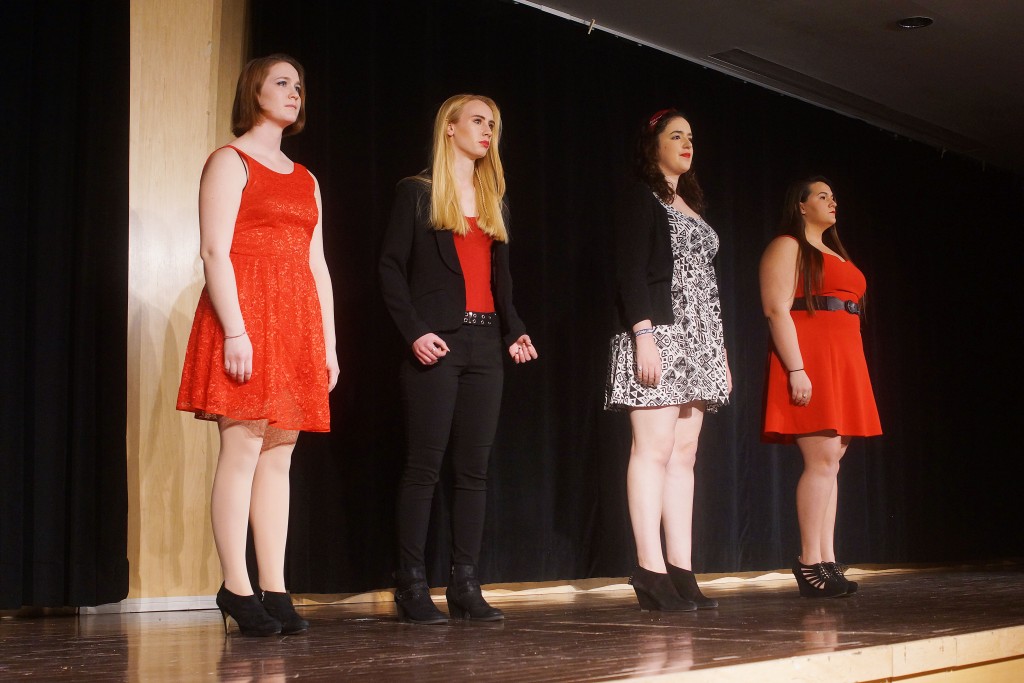
“I bet you’re worried,” says one speaker. “We were worried,” says a second. “We were worried about vaginas,” says the last.
These lines begin a rapid-fire sequence of speeches that discuss the subject of womanhood and the female reproductive system as part of the play “The Vagina Monologues.” The collection of declarations, written by Eve Ensler, was created in 1996 after she conducted countless interviews with women of all ages, races and sexualities. The narratives are as diverse in emotion as they are in inspiration.
This production is put on every year by the Dickinson Community Players (DCP) early in the spring semester — this year marking the performance’s 11th anniversary — and aims to spread awareness about a multitude of issues that women around the world face. In each monologue, an actress in the all-female cast captures the scripted moments of tenderness, injustice and perseverance with ease. This ensures that there’s something to identify with, empathize with or change the audience’s perspective during every moment of the play.
“These [topics] will make you uncomfortable and that’s okay,” said Kristen Mulvena, who performs the monologue “Because He Liked to Look at it” and is a senior majoring in psychology. “They’re supposed to make you uncomfortable because they’re supposed to make you question. They’re supposed to make you think twice about the things you may have said, you may have thought, you may have seen, you may have heard and the way you reacted or didn’t react.”
The play is staged with little scenery and with rarely more than one person onstage at a time. This forces the audience to focus on and confront the stigmas about vaginas that the actresses discuss in their monologues, including stigmas that are still taken for granted in the present day — 20 years after the play first opened off-Broadway. Most of these topics are taboo — it’s frowned upon to discuss things like the procedures at gynecologist visits and how disagreeable they are, or how uncomfortable it is to shave.
“All of [the topics] are perfectly natural; all of them are things that we face as women,” said Amanda MacDougald, who performs the monologue “I Was There in the Room” and is a senior majoring in English. “I think part of getting people to come out and see the show is getting them to rethink these issues.”
In a piece so heavily geared toward social change, the show is careful to address all facets of the gender ideology, from slurs used in place of the reproductive organ (“Reclaiming Cunt”) to rape and genital mutilation in war-ravaged countries (“Not-so-Happy Fact” and “My Vagina was My Village”). The intersectionality of the show is a favorite aspect of the show for Eliza Gellis, director of the show and a senior majoring in English.
“[It’s] awesome to come out and think about, ‘How can we expand definitions of feminism so that it really is inclusive?’” Gellis said.
Gellis stressed that, though the play is a safe space for women to discuss what feminism is for them, the work is equally as important for people of other genders who will watch the show and stand in solidarity with the women whose narratives are told. The play is one that requests an open mind of the audience, and in the context of this production group in a college setting, is likely to find another year of success in educating its audiences.
This play is a V-Day production, entailing that the rights to the play are free so long as the proceeds of the play are allocated to a charitable cause. For this production, the proceeds will be going to RISE, Broome County’s women’s shelter. The play will be showing February 19 at 8 p.m. and February 20 at 2 p.m. and 8 p.m. in the Chenango Champlain Collegiate Center multi-purpose room.


